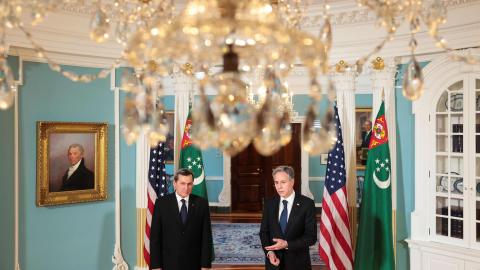The normally reclusive Central Asian state of Turkmenistan has been having an unusually busy time on the international stage. First, Eli Cohen became the first Israeli Foreign Minister to visit since 1994 when he opened a new Israeli embassy in the capital, Ashgabat.
The following week, Turkmenistan’s Foreign Minister Rashid Meredov was in Washington for talks with US Secretary of State Antony Blinken. At the same time, the head of US Central Command in the Middle East, Gen. Michael Kurilla, was in Ashgabat meeting high level Turkmen officials to discuss regional security issues.
Turkmenistan leans toward isolationism and pursues a policy of self-described “permanent neutrality.” However, this cautious approach does not diminish Ashgabat’s importance in the region. Turkmenistan sits in the heart of the Eurasian landmass, has the world’s fourth largest natural gas reserves and shares a 1,150 km border with Iran and an 800 km border with Afghanistan.
Turkmenistan maintains great relations with Turkiye, mainly due to cultural and linguistic ties but also growing energy cooperation. Turkmenistan was once part of the Soviet Union, and Moscow’s presence is never far away. Meanwhile China is showing more interest in Turkmenistan’s energy resources. Consequently, Ashgabat probably welcomes more attention from the US and the Middle East. This is why recent Israeli and American engagement is noteworthy.
Cohen’s visit to Ashgabat was the logical next step in Israel’s deeper engagement in the Caspian region. Before arriving, Cohen visited Azerbaijan across the Caspian Sea. Israel and Azerbaijan have had close relations over the years. Baku provides Israel with almost 40 percent of its crude oil. Israel provides Azerbaijan with advanced weapons such as drones. While it is not discussed publicly, it is thought that the two countries have a close intelligence sharing and counter terrorism relationship. In this context both have one country in mind: Iran.
Israel sees an opportunity to build relations in Central Asia and Turkmenistan as a natural choice for energy and security reasons. During his visit, Cohen described Turkmenistan as an “energy superpower” in Central Asia. “I came to open an Israeli embassy 17 kilometers from the border with Iran, and to hold a series of meetings with the president and other officials,” he said. The specific mention of the exact distance between the new Israeli embassy and the Iranian border was a clue to the real purpose of his trip. Although the Turkmens would be cautious about admitting it publicly, there’s little doubt that Iran was a top discussion item when the two foreign ministers met. After all, relations between Turkmenistan and Iran have had theirfair share of problems in recent years — including a dispute over gas payments of $1.8 billion that Tehran owes Ashgabat but refuses to pay.
Turkmenistan has recently sought to improve relations with the Gulf states too. Last month President Serdar Berdimuhamedow paid a visit to Qatar. Last November he visited the UAE. Both visits were a first for Berdimuhamedow since he replaced his father last year. Considering the geopolitical situation with Iran, and the momentum from the Abraham Accords, it’s only natural that Turkmenistan and Israel would elevate relations.
Just as with Israel, the increase in US engagement has a lot to do with Iran. But US has concerns aboutAfghanistan too. In the years before the Taliban took over in August 2021, there had been skirmishes between Turkmen security forces and the Taliban. The security situation in Afghanistan has always made Turkmen officials nervous. At one point the authorities in Turkmenistan even attempted to seal its border with Afghanistan using fences, ditches, and various means of surveillance. But since the Taliban’s takeover, Turkmenistan has pursued a pragmatic and open-minded approach to engagement with Kabul. As with other Central Asian states, it remains to be seen if this approach will yield benefits.
The two biggest challenges that CENTCOM faces in the region are the reemergence of transnational terrorist groups in Afghanistan and the ongoing malign activities of Iran. Turkmenistan straddles both these problems and is therefore an important interlocutor for the US. Considering Turkmenistan’s location, US policymakers and military leaders could learn a lot from Ashgabat’s view and opinions of the region. Where there is a possibility of deepened cooperation with Turkmenistan, the US will probably take advantage of the opportunity.
However, nobody should expect a major shift in Turkmenistan’s foreign policy approach under the new president, at least in public. Caution, balance, and reclusiveness will continue to drive Ashgabat’s relations with its neighbors and on the international stage. However, the Turkmen leadership is fully aware of the geopolitical challenges that its Iranian and Afghan neighbors present to regional stability. With Russian influence in the region waning because of Moscow’s focus on Ukraine, Turkmenistan will probably look to other regions and partners as a balancing act for cooperation.
The recent engagement between Turkmenistan, Israel, the US and even the Gulf states is an example of this. For regional stability and security this is a good thing.

















